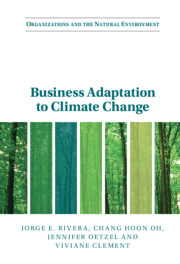Book contents
- Business Adaptation to Climate Change
- Organizations and the Natural Environment
- Business Adaptation to Climate Change
- Copyright page
- Dedication
- Epigraph
- Contents
- Figures
- Tables
- About the Authors
- Foreword
- Preface and Acknowledgments
- Publication Acknowledgments
- Part I Introduction
- Part II Conceptual Framework
- Part III Empirical Studies of Business Adaptation to Nature Adversity
- 6 Canary in the Coal Mine
- 7 MNC Disregard of Natural Disasters and the Role of Host Country Context
- 8 MNC Disaster Experience and Foreign Subsidiary Investment
- Part IV Conclusions
- Bibliography
- Index
6 - Canary in the Coal Mine
Western U.S. Ski Industry Adaptation to Warmer Temperatures
from Part III - Empirical Studies of Business Adaptation to Nature Adversity
Published online by Cambridge University Press: 28 April 2022
- Business Adaptation to Climate Change
- Organizations and the Natural Environment
- Business Adaptation to Climate Change
- Copyright page
- Dedication
- Epigraph
- Contents
- Figures
- Tables
- About the Authors
- Foreword
- Preface and Acknowledgments
- Publication Acknowledgments
- Part I Introduction
- Part II Conceptual Framework
- Part III Empirical Studies of Business Adaptation to Nature Adversity
- 6 Canary in the Coal Mine
- 7 MNC Disregard of Natural Disasters and the Role of Host Country Context
- 8 MNC Disaster Experience and Foreign Subsidiary Investment
- Part IV Conclusions
- Bibliography
- Index
Summary
Chapter 6 focuses on two key research questions highlighted in Chapter 3: How does nature adversity intensity affect the adoption of business protective adaptation strategies? And how do firm-level and institutional-level factors moderate the relationship between nature adversity intensity and protective adaptation? In this chapter we also test the propositions developed in Chapter 3. To do this, we study how the U.S. ski industry has adapted to warmer temperatures between between 2001-2013. Our data tracks snowfall and temperature conditions for western U.S. ski resorts between 1995-2013. Our findings show that firms facing medium nature adversity intensity levels (measured in terms of temperature) appear more likely to engage in higher adaptation while those experiencing low and high natural adversity intensity show a tendency for lower adaptation, yielding an inverted U-shaped relationship. Our findings also suggest that firm age, the stringency of the regulatory environment, and the presence of slack resources, induce a flattening of this inverted U-shaped relationship. Status as a public company, however, induces a steepening of the inverted U-shaped relationship.
- Type
- Chapter
- Information
- Business Adaptation to Climate Change , pp. 97 - 132Publisher: Cambridge University PressPrint publication year: 2022



